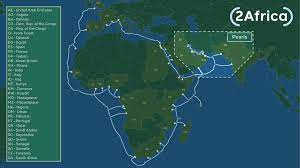The long-anticipated 2Africa subsea cable, considered one of the most robust cable systems to serve Africa and the Middle East, is set to land in Nigeria in November 2023. This remarkable project is a joint endeavor involving China Mobile International, Meta, MTN GlobalConnect, Orange, stc, Telecom Egypt, Vodafone, and WIOCC.
Stretching over 45,000 kilometers, 2Africa will have landing points in South-West’s Lagos and South-South’s Qua Iboe. Its primary objective is to offer much-needed internet capacity, redundancy, and reliability for both Nigeria and the broader African continent. Furthermore, it will play a pivotal role in meeting the rapidly increasing demand for internet capacity in the Middle East while facilitating the expansion of 4G, 5G, and broadband access for hundreds of millions of Africans. 2Africa has already landed in South Africa in 2022.
2Africa stands out as the most comprehensive subsea cable project to reach Africa, with a length that surpasses the Earth’s circumference. It will connect over 33 African countries, making it the largest undersea cable project within the cost-effective capacity category. This achievement is largely attributed to innovative technology provided by Alcatel Submarine Networks and is expected to provide nearly three times the total network capacity of all the subsea cables currently serving Africa.
The journey of 2Africa commences in Genoa, located in northern Italy, and extends across multiple countries, including Spain, France, the Middle East, Pakistan, and India, before reaching its termination point near the southern tip of the United Kingdom.

In terms of capacity, 2Africa is anticipated to deliver a staggering 180 terabits per second (Tbps), surpassing Google Equiano’s 144 Tbps by 25% and dwarfing the combined 46 Tbps currently available in Nigeria by an impressive 291%. This heralds a significant advancement in connectivity for the region and is expected to boost digital inclusion in Africa. However, last-mile challenges still remain an issue in Africa’s biggest economy and if not resolved, many Nigerians may not fully benefit from the new subsea cable.




